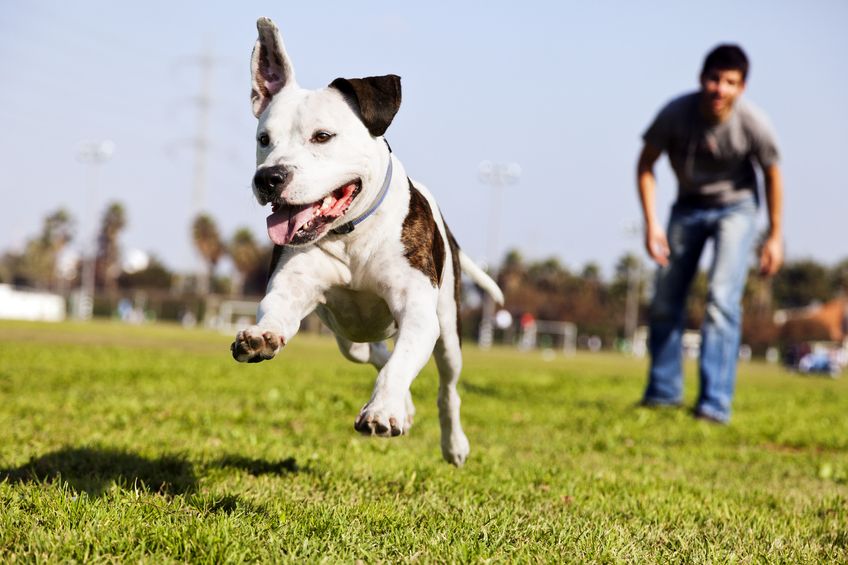So you’re one of the millions of dog owners in the world? Congratulations! You already know how much fun you have with your four-legged friend, but you might not be aware of the health benefits you’re enjoying. Sure, it’s great when he sees you at the end of your workday, with his tail wagging and his bark that tells you how happy he is that you’re back home. But there’s a growing body of scientific research that indicates your beloved pet could actually be making you healthier. The research into this area is relatively new, but the early indications show that being a pet owner can help you in many different ways. These are just a few:
1. Boosts Mental Health
People who own pets know just how important they can be during tough times. A dog can make a bad day a lot better just by showing his unconditional love. But if you think you’re just imagining that feeling, you’d be wrong. Research shows that a person will typically behave in a healthier fashion after having a pet for a month, compared to a non-pet owner.1
The same study showed that there could be substantial psychological benefits to being a pet owner as well. More than 200 people participated in the study and answered questions that were used to determine their overall well-being as well as their personality type. According to the results, the people who owned a pet tended to be not only happier, but also better adjusted and healthier than those who didn’t own a cat or a dog.2

2. Reducing Stress
How can you feel stressed when petting your dog? It would seem to be almost impossible. But there’s science behind that relaxed feeling you get. Spending time with a dog helps stimulate the production of a hormone called oxytocin. This plays a major role in relaxing both you and your dog during bonding time.3
3. Allergy Risk Reduction
You might have been hesitant to become a dog owner because you were worried you, your spouse, your children or anyone else under your roof would be at a higher risk of developing an allergy. However, research shows that the opposite is true. According to one study, children who grow up in a home with a dog have less of a chance of developing eczema, a frustrating skin condition that can, in many instances, not only result in itching but also a substantial amount of pain.4
4. Helping You Bounce Back Faster From an Illness
If you’re a dog owner, you might be able to recover more quickly if you suffer a severe illness. This is one of the philosophies behind the therapy dogs that often make the rounds in medical facilities such as nursing homes, hospitals and rehabilitation centers. One particular study was performed to examine the effectiveness of therapy dogs who were in a hospital visiting patients suffering from heart failure. The results showed that the patients who came in contact with the dogs saw a reduction in blood pressure as well as anxiety levels compared to other patients who were not visited by the dogs.5 Another study showed that a dog owner who has a heart attack has a better chance of still being alive a year later than someone who doesn’t own a dog.6
It can be especially helpful for an elderly person to have a dog. Researchers conducting a study found that being a dog owner can help reduce feelings of loneliness in elderly people with significant physical issues.7 It’s possible that older adults who have a dog might not have to visit the doctor as often. In fact, one study showed that senior citizens on Medicare who had a pet visited the doctor less often over a one-year period than elderly people who didn’t have a pet.8

5. Helping You Stay Active
One of the best things you can do as a dog owner is to take him for walks as often as you can. This is not only great for your dog’s health, but for yours as well. A study showed that dog owners usually exercise substantially more often than someone who doesn’t have one. In fact, it showed that a dog owner usually gets an average of 30 minutes of exercise five days a week.9
But a dog can also help keep your children active and fit. Cats are great, too, but they usually won’t come up to you wanting to go outside a play. Most dogs, on the other hand, love to play regardless of the time of day. Research shows that children who live in homes with one or more dogs spend a great deal more time being active than those who grow up in families that don’t include a dog.10
The connection between being a dog owner and being engaged in physical activity has been proven to be valid. One study performed by Canadian researchers, for example, showed that people who don’t own a dog tend to walk an average of about 170 minutes each week, while a dog owner walks about 300 minutes each week.11
Unfortunately, there’s also research indicating that a lot of dog owners fail to take their companions for walks often enough. According to one study, the majority of dog owners don’t walk their pooches at least three times each week. Elderly dog owners go on walks with their pet even less often.12
6. Reducing Your Blood Pressure
Being a dog owner, according to research, could also help lower your blood pressure levels, and as a result, help lower the chances you’ll have to deal with heart problems. Researchers conducted a study involving approximately 1,600 participants age 60 and older. They found that the people who had a pet had significantly lower blood pressure than those who didn’t. You can substantially reduce your risk of suffering a stroke or heart disease by reducing your blood pressure even a small amount. 13
The American Heart Association recently reported that, according to research announced during a meeting of the Society of Behavioral medicine, owning a pet could reduce the risk of developing heart disease. A group of 30 patients who had been diagnosed with hypertension (high blood pressure) were divided into two groups. One of them had recently become dog owners, while the others did not have a pet.
Two and five months after the start of the study, the participants had their blood pressure checked. According to the results, the group of dog owners showed significantly lower blood pressure levels than those who had not adopted a pet. All 30 patients had adopted a dog by the end of the study, and all of them had substantially lower blood pressure readings. 14
The evidence showing a link between being a dog owner and having lower blood pressure is extremely impressive. A study involving 50 stockbrokers with hypertension showed that the ones who had a pet (either a cat or a dog) had less of an increase in blood pressure than those who did not have pets. In addition, the pet owners exhibited a lower heart rate. 15 Finally, an Australian study was performed to investigate the link between being a dog owner and hypertension. This study analyzed the blood pressure readings of nearly 6,000 people who had attended a clinic that offered free screenings. The dog owners had blood pressure readings that were an average of 3 percent lower than the ones who didn’t have a pet.16

Your Dog’s Keeping You Healthy – Make Sure You do the Same for Him
Now that you know there’s a definitive relationship between being a dog owner and enjoying improved health, that should motivate you even more to do all you can to keep your companion as healthy and happy as possible.
One of the most important things you can do is to make sure your dog’s diet is balanced and healthy. As tempting as it is for all of us to spoil our dogs, we’re really not doing them many favors when we give them too much human food. Doing so can make them obese, which, can lead to a wide variety of health problems. Have a talk with your veterinarian to see which type of food might be the best for your beloved friend.
More tips on Keeping Your Dog Healthy
· Make regular trips to the vet for checkups. While you’re probably thinking to yourself that this is obvious, unfortunately, you’d be surprised at how many dog owners fail to do this. If you just adopted a new pooch and you haven’t found a vet, talk to someone at your local animal shelter for recommendations, or ask family members, neighbors or friends.
· Show the same kind of love toward your dog as he shows to you. Take the time to play with him and show affection as often as you can. Also, keep your dog inside as much as you can even if you have a huge yard. While your dog obviously loves running around and playing, always remember he wants to be with you as much as possible.
· Have your dog spayed or neutered. Research shows that there are a lot of benefits to spaying or neutering. These include longer life, improved overall health, and less of a tendency to exhibit behavioral problems such as running away or biting. There are a lot of options that you can explore if you feel that you’d have a problem paying for a spay or neuter procedure.17
· Always be alert to any signs that your dog might be developing some sort of health issue. Get him to a vet as soon as possible if he all of a sudden becomes lethargic, or if he shows some sort of sudden behavioral change. The faster you act, the sooner you can find a potential solution to the problem.
Although being a dog owner obviously comes with a great deal of responsibility and time commitment, the affection and personal health benefits you get in return are more than worth it!
For more tips on having a healthy, well-balanced life, keep reading here:
Boswellia Serrata Extract – Reduce Pain with Tree Sap?
The Healing Power of Turmeric (+ 2 recipes to get more in your diet!)
Sources:
1. McConnell, Allen R., and Christina M. Brown. Friends With Benefits: On The Positive Consequences Of Pet Ownership. 2011. Print.
2. McConnell, Allen R., and Christina M. Brown. Friends With Benefits: On The Positive Consequences Of Pet Ownership. 2011. Print.
3. Nagasawa, Miho. “Dog’s Gaze At Its Owner Increases Owner’s Urinary Oxytocin During Social Interaction – Sciencedirect.” Sciencedirect.com. N.p., 2009. Web. 28 July 2017.
4. Epstein, Tolly G. et al. “Opposing Effects Of Cat And Dog Ownership And Allergic Sensitization On Eczema In An Atopic Birth Cohort.” N.p., 2017. Print.
5. Cole, Kathie et al. “Animal-Assisted Therapy In Patients Hospitalized With Heart Failure.” Ajcc.aacnjournals.org. N.p., 2017. Web. 28 July 2017.
6. Friedman, E. “Animal Companions And One-Year Survival Of Patients After Discharge From A Coronary Care Unit..” N.p., 1980. Web. 28 July 2017.
7. McNichols, June. Pet Ownership And Human Health: A Brief Review Of Evidence And Issues. 2005. Print.
8. McConnell, Allen R., and Christina M. Brown. Friends With Benefits: On The Positive Consequences Of Pet Ownership. 2011. Print.
9. Westgarth, Carri, Robert M Christley, and Hayley E Christian. “How Might We Increase Physical Activity Through Dog Walking?: A Comprehensive Review Of Dog Walking Correlates.” N.p., 2017. Print.
10. Owen, Christopher. “Family Dog Ownership And Levels Of Physical Activity In Childhood: Findings From The Child Heart And Health Study In England | AJPH | Vol. 100 Issue 9.” Ajph.aphapublications.org. N.p., 2017. Web. 28 July 2017.
11. RE, Brown. “Relationships Among Dog Ownership And Leisure-Time Walking In Western Canadian Adults. – Pubmed – NCBI.” Ncbi.nlm.nih.gov. N.p., 2017. Web. 28 July 2017.
12. Thorpe, Roland J. et al. “Dog Ownership, Walking Behavior, And Maintained Mobility In Late Life.” N.p., 2017. Print.
13. Ben Sutherly, The Columbus Dispatch. “Grab That Leash: Dog Ownership May Reduce Risk Of High Blood Pressure.” The Columbus Dispatch. N.p., 2017. Web. 28 July 2017.
14.”Dogs, Cats May Be Heart Healthy, AHA Says.” Medpagetoday.com. N.p., 2017. Web. 28 July 2017.
15. Allen K, et al. “Pet Ownership, But Not Ace Inhibitor Therapy, Blunts Home Blood Pressure Responses To Mental Stress. – Pubmed – NCBI.” Ncbi.nlm.nih.gov. N.p., 2017. Web. 28 July 2017.
16. Levine, Glenn. “Pet Ownership And Cardiovascular Risk A Scientific Statement From The American Heart Association.” N.p., 2013. Web. 28 July 2017.
17. “Ten Dog Care Essentials : The Humane Society Of The United States.” Humanesociety.org. N.p., 2017. Web. 28 July 2017.
